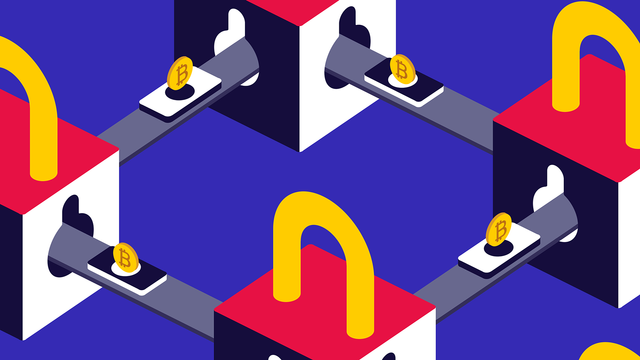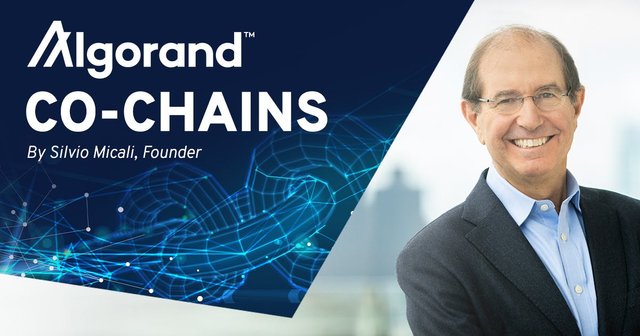A BOUNDLESS ECONOMY REVOLUTIONIZING THE MULTI-CHAIN ARCHITECTURE
Blockchain technology isn't just a more efficient way to settle securities. It will fundamentally change market structures, and maybe even the architecture of the Internet itself. - Abigail Johnson

For a better understand of the above definition; there is a hand-shaking Process in MultiChain which occurs when the nodes in a blockchain connect with each other. A Multi-Chain will take place when two blockchain nodes connect with each such that the identity of each node represents itself with an address having a list of permissions. Hence, each node which it represents sends a message to the other users. The P2P connection is aborted if they do not receive any satisfactory confirmation from the whole process.
In a Multi-Chain processing, the transaction fees and the Block incentive is null by default. Hence, these value can be named in the params.dat file. This file encapsulates the whole configuration such as:
- Active permission type
- Approved type of transaction
- Maximum block size
- Maximum meta data per transaction
- Mining diversity
- Mining incentive
- The Block target time
- The chain protocol
Note that configuring a blockchain, parameters are set in the params.dat file for each blockchain, which can be modified in any text editor like Notepad++, TextPad, etc.
Algorand is a technology company and a platform built to remove friction from financial exchange. Algorand Inc. is powering the DeFi evolution by enabling the creation and exchange of value, building new financial tools and services, bringing assets on-chain and providing responsible privacy models. No doubt, Algorand blockchain is an interesting scientifically backed platform that incorporate the Multi-Chain features into its own algorithm.
The global world needs both permissionless and permissioned blockchains. Algorand provides best-of-breed implementations for the both. Primarily, at Algorand, we guarantee our own synergy. Meaning, no matter how scalable, distributed, and secure a permissioned chain may be, its members may not want to interact only with each other, but also to extend their interaction with other chains and possibly with the world at large.

By making public and private blockchains interoperable, organizations can isolate and control sensitive data on a private blockchain while still safely interacting universally through an interoperable public blockchain. Algorand has been developing its own co-chain architecture for organizations to enjoy the advantages of both types of blockchain (private and public) and this is accomplishable as thus:
i. The on-chain will be totally independent from the public chain as it shields its transactions from all outsiders, chooses its own validators, and runs its own Algorand consensus algorithm,
ii. It interoperates with the Algorand main chain to transact with outside co-chains, and everyone else, with the same ease and security with which the members of Algorand’s permissionless chain transact with each other, and
iii. It enjoys both in its internal and external interactions, the same atomic transactions, layer-1 smart contracts, and all other tools and primitives offered by the permissionless Algorand protocol. In fact, it automatically inherits all the improvements and upgrades that will be added to Algorand’s permissionless protocol as time goes by.
Pure proof-of-stake (Pure PoS) is an awesome feature of Algorand that stands it out among its counterparts. Pure PoS is a design implementation that defines how people can participate in a decentralized network while ultimately preventing forged identities. Pure PoS is a mechanism of which when combined with a Byzantine agreement protocol, it creates a way for a large group of people to achieve consensus or a single and verifiable source of truth. Pure PoS to us simply means that for anyone wanting to participate in the Algorand network, they can easily make a signal of his/her intent by flagging an account with ALGOS as a participant (take for instance, like flipping on a light switch). The likelihood of users being selected will be determined by the amount of ALGOS they have in their account relative to all other accounts who have also signaled their intention to participate. The word “Pure” here means they are free to come and go as they are pleased and at the time that they like because their ALGOS are not locked up nor bonded for any period of time as in other PoS systems. In other words, any user can turn off the light switch at any time with no penalty or fear of losing their stake.
An account on Algorand can either be offline or online. An account is offline if it does not participate in the consensus protocol, and is online if it does participate in the consensus protocol. An account in either state can always transact. Any offline account can choose to become online, and vice versa by posting a special transaction on the blockchain.
In the Algorand ecosystem, the power is in the hands of the users holding stake. Every user receives an amount of rewards proportional to their stake for every block that is committed to the chain. This being put into place by the team to encourage users to join the Algorand platform and accelerate its path to decentralization.
The Algorand co-chain architecture enables the members of a permissioned chain to work most securely and efficiently not only with each other, but also with the Algorand permissionless chain and members of other chains as well while retaining maximum autonomy.

ALGORAND HEARTS THE DECENTRALIZATION OF USERS’ TRANSACTION
Generally speaking, decentralization means that no single entity has exclusive control over data or processes. Thanks to blockchains that provides a basic level of decentralization because transactions are recorded by all users on the blockchain network.
At Algorand, what decentralization means to us is; not to have to trust a centralized entity as the single source of truth in the network. That is, it is the responsibility of every user to run and maintain the network. Our borderless economy allows anything of value to be traded between two or more parties, wherever they may be, without the friction of current financial networks.
There is an Atomic Swap nature on the blockchain of Algorand. An atomic swap enables two parties to exchange different cryptocurrencies (coins or tokens) without the risk of one party defaulting on the trade. Traditional atomic swaps are implemented via multiple steps using both time with hash-locks, and require substantial time to be completed. Algorand is pioneering Atomic Swaps that enable two users of the Algorand’s chain/sub-chains to simply exchange money and/or different assets by means of a single transaction without any locks.
When it comes to Private Vs. Public blockchains, Algorand's Co-Chain architecture offers the Best of both worlds. The consensus mechanism on Algorand is permissionless and pure proof-of-stake. It ensures full participation, protection, and speed within a truly decentralized network. With blocks finalized in seconds, Algorand’s transaction throughput is always high with large payment and financial networks. Algorand is the first blockchain to provide immediate transaction finality that is no forking, no uncertainty!
Join us live for a Virtual question and answer session on Algorand Co-Chains with Silvio Micali & Team.

Date: Tuesday, April 7, 2020 by 8:15 AM - 9:30 AM EDT.
REGISTER NOW to keep a space for yourself!
Do you think I have missed out on something or you have a question to ask? If yes, then kindly point it out in the comment section below to let me know.
You can also connect with me on Twitter…
interesting!